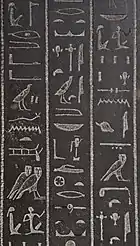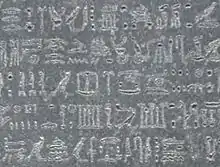
A quadrat block (or quadrate block) is a virtual rectangle or square in Egyptian hieroglyphic text.
The glyphs (hieroglyphs) can be variable in number within the virtual block, though they are often proportioned according to variable standardized rules of scribal methods.[2]
The definition for the block in Illustrated Hieroglyphics Handbook by Schumann-Antelme and Rossini, is: "A 'quadrate' is a virtual square, which although not drawn, guides the hand of the scribe. Hieroglyphs must be aesthetically positioned within the quadrate and their size must be proportioned accordingly. They form groups that are pleasing to the eye and based on the laws of balance."[3]
Rosetta Stone closeup

An example of five lines of text from the Rosetta Stone, (lines 9, 10, 11, 12, 13), shows a width of about six to seven virtual blocks. Line 12, (fourth line) is illustrative of the variable size, in this case the widths, of the 'virtual quadrate blocks'.
- The time of the festivals are stated as: "...day 1 up to day 5...", (three blocks)[4]
|
|
|
- The three blocks:
|
|
|
|
(See: N-red crown (n hieroglyph), N-water ripple (n hieroglyph))
Amun-Ra's block
. Note how the vertical hieroglyph for reed-(the i for 'Amun') is actually part of the block, though at its side.

 A Ptolemy, cartouche with various quadrate blocks.
A Ptolemy, cartouche with various quadrate blocks.
See also
- Egyptian hieroglyphs
- Egyptian Hieroglyph Format Controls (Unicode block)
References
- ↑ 3-strokes (hieroglyph);
- ↑ Schumann-Antelme and Rossini, Illustrated Hieroglyphics Handbook, subsection: General Considerations on Hieroglyphic Writing, p. 13-14.
- ↑ Schumann-Antelme and Rossini, p. 13.
- ↑ Budge, p. 160-167.
- ↑ Eternity (hieroglyphs)
- Budge. The Rosetta Stone, E.A.Wallace Budge, (Dover Publications), c 1929, Dover edition(unabridged), 1989. (softcover, ISBN 0-486-26163-8)
- Schumann-Antelme, and Rossini, 1998. Illustrated Hieroglyphics Handbook, Ruth Schumann-Antelme, and Stéphane Rossini. c 1998, English trans. 2002, Sterling Publishing Co. (Index, Summary lists (tables), selected uniliterals, biliterals, and triliterals.) (softcover, ISBN 1-4027-0025-3)